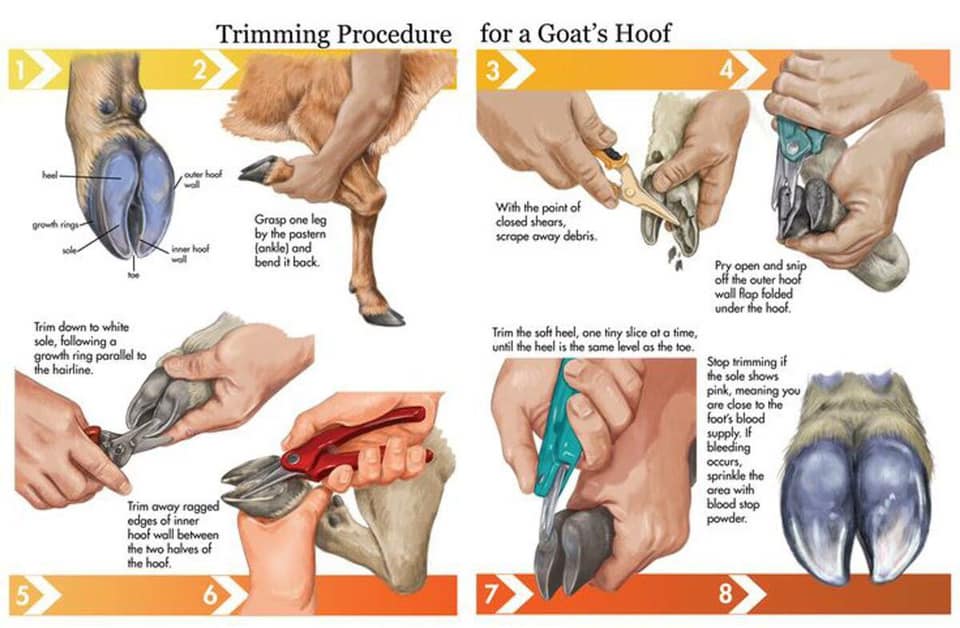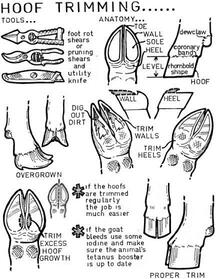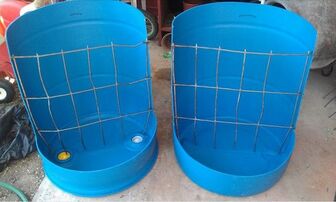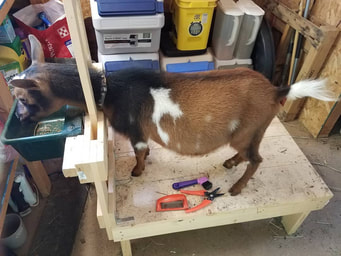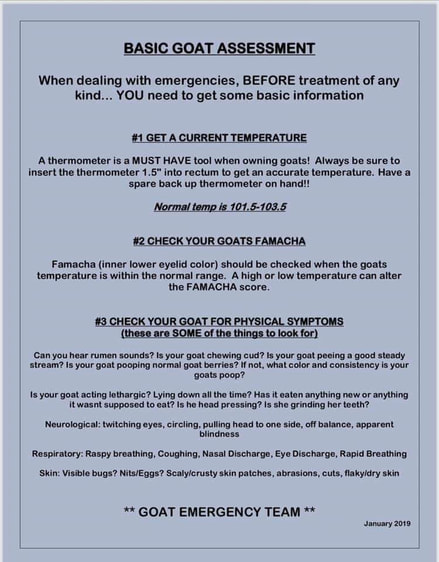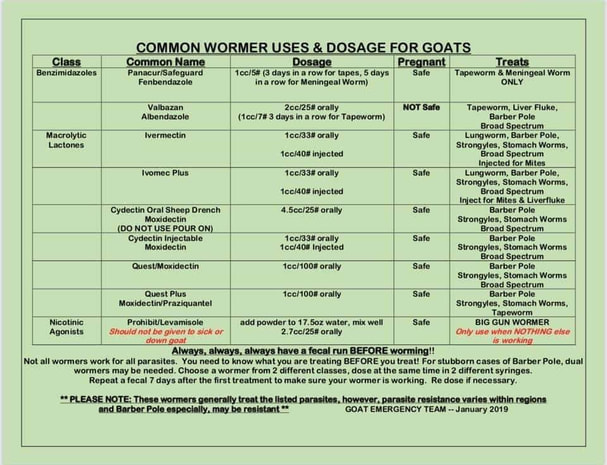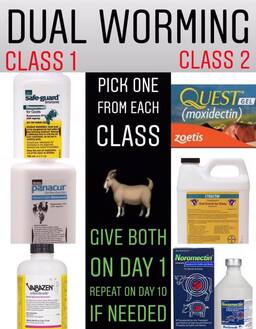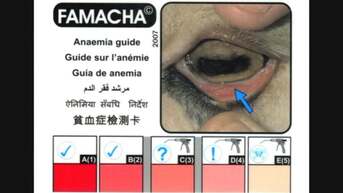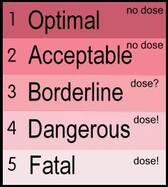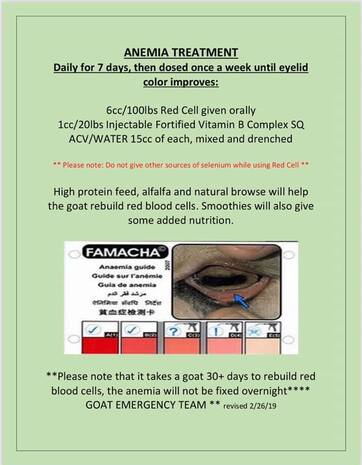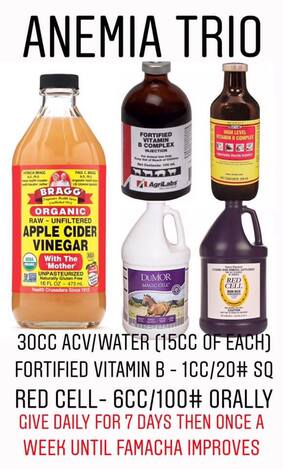Basic Goat Care
Welcome to Your New Life as a Crazy Goat Person!
Congratulations on the purchase of your new kid(s). We truly hope that you enjoy your new baby as much as we have. We are passionate about raising friendly, healthy goats for families, like yours, to enjoy.
We have enclosed some important information that you may find useful. You may discover that you already know some or all of what is included. Please know that this is just our opinion and we do not claim to be a vet, by any means. We pay very close attention to our herd and it all comes down to knowing your goats. Any brands mentioned are only suggestions. Decide what works best for your herd.
This brings me to my greatest piece of advice…truly know your herd. Become familiar with each animal’s personality and traits. If something seems off, take action! Many people have different opinions about how they raise their own goats and that is ok as long as you’re able to recognize when there might be an underlying issue.
We welcome you to the world of goats and want you to know we are here for you every step of the way!
Feel free to contact us any time you need advice and please share pictures of your new babies often!
Congratulations on the purchase of your new kid(s). We truly hope that you enjoy your new baby as much as we have. We are passionate about raising friendly, healthy goats for families, like yours, to enjoy.
We have enclosed some important information that you may find useful. You may discover that you already know some or all of what is included. Please know that this is just our opinion and we do not claim to be a vet, by any means. We pay very close attention to our herd and it all comes down to knowing your goats. Any brands mentioned are only suggestions. Decide what works best for your herd.
This brings me to my greatest piece of advice…truly know your herd. Become familiar with each animal’s personality and traits. If something seems off, take action! Many people have different opinions about how they raise their own goats and that is ok as long as you’re able to recognize when there might be an underlying issue.
We welcome you to the world of goats and want you to know we are here for you every step of the way!
Feel free to contact us any time you need advice and please share pictures of your new babies often!
Disbudding, tattooing and castration (per request or deemed necessary by Sylvan Wind) have all been completed. Tattoo numbers are located on your registration paperwork.
CD/T Vaccinations and Booster (4 weeks later) will be completed upon request. If vaccinated, your goats should receive a booster (single dose) annually on or around the booster date indicated on your “Kid Health Record”. This may be ordered online through Jeffer’s Pet or purchased at Tractor Supply Company.
Feeding Your kid was weaned somewhere between 10-12 weeks of age. They are now eating the same feeding regimen as we feed all our goats. The most important thing to consider when choosing grain and supplements is adequate calcium to phosphorus ratio. We aim for a 2-3:1 ratio. In addition, make sure you are using a grain specifically designed for goats. All stock feed is made to feed most livestock animals, but may lack proper nutrition for your goats. For example, sheep cannot have copper. It is toxic to sheep. Goats, however, NEED copper in their diet or they’ll develop deficiency. Our feeding regimen is as follows:
CD/T Vaccinations and Booster (4 weeks later) will be completed upon request. If vaccinated, your goats should receive a booster (single dose) annually on or around the booster date indicated on your “Kid Health Record”. This may be ordered online through Jeffer’s Pet or purchased at Tractor Supply Company.
Feeding Your kid was weaned somewhere between 10-12 weeks of age. They are now eating the same feeding regimen as we feed all our goats. The most important thing to consider when choosing grain and supplements is adequate calcium to phosphorus ratio. We aim for a 2-3:1 ratio. In addition, make sure you are using a grain specifically designed for goats. All stock feed is made to feed most livestock animals, but may lack proper nutrition for your goats. For example, sheep cannot have copper. It is toxic to sheep. Goats, however, NEED copper in their diet or they’ll develop deficiency. Our feeding regimen is as follows:
BUCKS & WETHERS
We feed each goat 1 cup of Co-Op brand grain (#93458PE) twice daily (morning and evening).
DOES
Does NOT in lactation are fed 1 cup of Triple Crown Senior (Horse) Feed twice daily (morning and evening). Does IN LACTATION are fed the same grain, but amount varies depending on pounds of milk produced. Generally, we feed 1 pound of food per 3 pounds of milk produced twice daily (morning and evening). This works out to roughly 3-4 cups per doe each feeding.
We feed each goat 1 cup of Co-Op brand grain (#93458PE) twice daily (morning and evening).
DOES
Does NOT in lactation are fed 1 cup of Triple Crown Senior (Horse) Feed twice daily (morning and evening). Does IN LACTATION are fed the same grain, but amount varies depending on pounds of milk produced. Generally, we feed 1 pound of food per 3 pounds of milk produced twice daily (morning and evening). This works out to roughly 3-4 cups per doe each feeding.
Goats should ALWAYS have fresh, quality hay available to them, 24/7, year round. This is imperative to proper rumen function. In the cold, winter months, this is the fuel to keep them warm at night. We feed a horse quality grass or orchard hay to our "general population" and alfalfa to our bred/lactating does . ALWAYS provide clean, fresh water. We change/refill waters several times each day. They prefer trees, brush, vines and your favorite flowers over grass any day. They LOVE warm water in the cold months. (NEVER give water in a bottle, as this can cause death).
Having free choice minerals for them at all times is a good idea. We prefer Sweetlix Meatmaker. Sweetlix can be ordered online, but requires freight shipping. (We ask our local feed store to order it for us to save on shipping). We also provide Zinpro 40. Blocks do not work well for goats. Their tongues are not coarse like and cow and they cannot get what they need off a block.
We are in a copper deficient area. Please check the USGS maps or contact your local Ag Extension Agent for information on your particular area. Research the signs of copper deficiency so that you can adequately assess your goats. We choose to treat our goats with a copper bolus, as needed. We use UltraCruz, which can be purchased online. These come in a 2g Kid dose (under 1 year) and a 4g Adult dose.
Hoof trimmings are done here faithfully each month. This is VERY important. It will help prevent hoof rot and improper walking. Trimmers can be purchased online or at Tractor Supply Company.
Having free choice minerals for them at all times is a good idea. We prefer Sweetlix Meatmaker. Sweetlix can be ordered online, but requires freight shipping. (We ask our local feed store to order it for us to save on shipping). We also provide Zinpro 40. Blocks do not work well for goats. Their tongues are not coarse like and cow and they cannot get what they need off a block.
We are in a copper deficient area. Please check the USGS maps or contact your local Ag Extension Agent for information on your particular area. Research the signs of copper deficiency so that you can adequately assess your goats. We choose to treat our goats with a copper bolus, as needed. We use UltraCruz, which can be purchased online. These come in a 2g Kid dose (under 1 year) and a 4g Adult dose.
Hoof trimmings are done here faithfully each month. This is VERY important. It will help prevent hoof rot and improper walking. Trimmers can be purchased online or at Tractor Supply Company.
Adequate shelter is also very important. Your goats need a dry, draft-free place to get out of inclement weather. They absolutely HATE getting wet. For bedding, we prefer to use a thick layer of pine wood chips in the winter. These are more absorbent than straw and much easier to clean out. Sweet PDZ is applied under the shavings to help reduce ammonia smell. Stalls are picked daily, with PDZ and shavings replenished, as needed. During the hot summer months, we do not use any bedding in their stalls. This allows us to hose the stalls down daily (because of a hard surface floor). If your floor is not solid or protected, we recommend using a layer of wood chips year round.
We recommend you purchase a few general care items. These are what we have found useful for us.
Flat back water buckets can be attached to the wall with carabiners so they can’t tip them. Place them high enough that your goats won’t litter them with “goat berries” (fecal matter). If needed, you can place a 4” solid block in front of the bucket(s) as a step stool for them.
Depending on your pasture and barn set up, you may want to add water troughs in your pasture. There are a variety of these, ranging from plastic to metal. We chose to use galvanized wash tubs simply due to their size and low cost.
A split mineral feeder makes keeping baking soda and minerals out much easier. This should be attached to the wall of your barn indoors. They need to be kept dry or you will have significant waste. Minerals and baking soda should be kept out at all times with free choice. They will eat, as needed. Minerals are just that…they provide minerals they may be lacking from feed. Baking soda helps with bloat. Just regular old baking soda.
We recommend you purchase a few general care items. These are what we have found useful for us.
Flat back water buckets can be attached to the wall with carabiners so they can’t tip them. Place them high enough that your goats won’t litter them with “goat berries” (fecal matter). If needed, you can place a 4” solid block in front of the bucket(s) as a step stool for them.
Depending on your pasture and barn set up, you may want to add water troughs in your pasture. There are a variety of these, ranging from plastic to metal. We chose to use galvanized wash tubs simply due to their size and low cost.
A split mineral feeder makes keeping baking soda and minerals out much easier. This should be attached to the wall of your barn indoors. They need to be kept dry or you will have significant waste. Minerals and baking soda should be kept out at all times with free choice. They will eat, as needed. Minerals are just that…they provide minerals they may be lacking from feed. Baking soda helps with bloat. Just regular old baking soda.
|
Of course, since your herd needs access to hay all the time, you will need a good hay feeder. There are a variety of feeders available for sale through TSC or a farm supply store. We recommend one that has a tray beneath it to catch hay as it falls. This will help to eliminate hay waste. DO NOT use the hay nets for horses. These can cause death as goats often get caught in them. We were able to make two of these for less than $40 using a cattle panel, plastic barrel and some zip ties. They work extremely well, but you will need to clean the bottom out occasionally when it gets too full of hay.
Walmart also carries a wire laundry basket that works perfectly! |
|
We also recommend building or purchasing a milk stand or stanchion, even if you don’t want to milk. Stands are an asset for medical care and hoof trims. Any time we need to restrain an animal, we use our stand. You can purchase or build a stand made from a variety of materials, including metal, PVC and wood. We chose to build our own and found the plans from Fiasco Farm to be perfect for Nigerian Dwarf. You can find and print the plans here.
|
A good goat veterinarian is worth his/her weight in gold. We cannot stress this enough – a great vet is not automatically a great goat vet. We have learned the hard way that not all vets are created equal when it comes to goats, even those who are livestock or all stock vets. In our opinion, many of the older livestock vets are not “up to speed” with current practices in the goat world. We are members of several local goat organizations and will gladly help you find a recommended vet in your local area.
You should familiarize yourself with emergency care and have a well-stocked medicine cabinet. A well-stocked medicine cabinet (or bag) can be the difference between life and death for your goat.
If an animal in your herd is presenting any symptoms of something being wrong, the first step is to complete a basic goat assessment . This should be done BEFORE you start any treatment personally or call your emergency vet.
You should familiarize yourself with emergency care and have a well-stocked medicine cabinet. A well-stocked medicine cabinet (or bag) can be the difference between life and death for your goat.
If an animal in your herd is presenting any symptoms of something being wrong, the first step is to complete a basic goat assessment . This should be done BEFORE you start any treatment personally or call your emergency vet.
|
Common Symptoms/Signs to Watch For Include:
|
We do not recommend deworming on a schedule. Due to parasite resistance, the recommend protocol is to have a fecal test done. This can be done with your local vet or through an online lab. You may also purchase a microscope and learn to do your own. Once the test results are returned to you, you can treat as needed. We recommend fecal testing on a schedule and complete our own on a monthly basis.
Some parasites, like Barberpole (most common and dangerous), mites, lice and liver flukes cause anemia in goats. Because of this, we firmly believe all herd owners should understand the importance of FAMACHA scoring and how to properly do it. This is something we do almost daily within our herd. If we have an animal with a score of 3 (see image below), we complete a fecal test. Animals with a score of 4-5 are immediately treated for barberpole and anemia. This video helps explain the reason to check FAMACHA regularly, as well as how to properly perform the test. Of course, we will gladly show you, as well.
Additional Treatment Posters
Please note: We highly recommend having all medications needed for treatments on hand in your medicine cabinet or bag. Some may not be available locally or without a prescription.
Animal Attack and/or Shock
Bloat Treatment
CDT Toxoid vs. Antitoxin
Coccidia Treatment
Commonly Used Prescription Antibiotics
Commonly Used Over the Counter Antibiotics
Enema
Enterotoxemia and Compromised Rumen
External Parasites (Fleas, Mites and Lice) Treatment
Pain, Inflammation and Fever Reducers
Pneumonia and Respiratory Infection Treatment
Poisoning Treatment
Polio and Listeria Treatment AND Polio/Listeria
Recovery Smoothies
Urinary Calculi
Warming a Cold Goat
Please note: We highly recommend having all medications needed for treatments on hand in your medicine cabinet or bag. Some may not be available locally or without a prescription.
Animal Attack and/or Shock
Bloat Treatment
CDT Toxoid vs. Antitoxin
Coccidia Treatment
Commonly Used Prescription Antibiotics
Commonly Used Over the Counter Antibiotics
Enema
Enterotoxemia and Compromised Rumen
External Parasites (Fleas, Mites and Lice) Treatment
Pain, Inflammation and Fever Reducers
Pneumonia and Respiratory Infection Treatment
Poisoning Treatment
Polio and Listeria Treatment AND Polio/Listeria
Recovery Smoothies
Urinary Calculi
Warming a Cold Goat
Books and Resources
Additional Links and Resources (many of the links on this page are listed here, as well)
Diet for Wethers: A Guide to Feeding Your Wether for Health and Longevity (infomartion can be applied to entire herd)
Fiasco Farm
Giving Your Goat Injections
Goat Emergency Help and General Questions (Facebook)
Jeffers Pet
Nigerian Dwarf Goats (Facebook)
Ontario Goat
PBS Animal Health
Sheep and Goat Medicine
Storey's Guide to Raising Miniature Livestock
Tennessee Meat Goats
Valley Vet
Additional Links and Resources (many of the links on this page are listed here, as well)
Diet for Wethers: A Guide to Feeding Your Wether for Health and Longevity (infomartion can be applied to entire herd)
Fiasco Farm
Giving Your Goat Injections
Goat Emergency Help and General Questions (Facebook)
Jeffers Pet
Nigerian Dwarf Goats (Facebook)
Ontario Goat
PBS Animal Health
Sheep and Goat Medicine
Storey's Guide to Raising Miniature Livestock
Tennessee Meat Goats
Valley Vet

